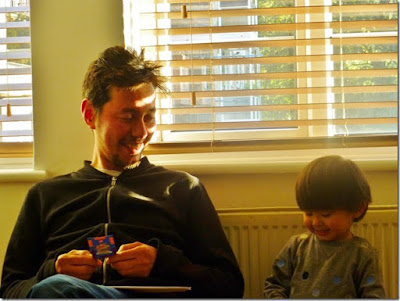Thought Fox by Ted Hughes
I imagine this midnight moment's forest:
Something else is alive
Beside the clock's loneliness
And this blank page where my fingers move.
Through the window I see no star:
Something more near
though deeper within darkness
Is entering the loneliness:
Cold, delicately as the dark snow
A fox's nose touches twig, leaf;
Two eyes serve a movement, that now
And again now, and now, and now
Sets neat prints into the snow
Between trees, and warily a lame
Shadow lags by stump and in hollow
Of a body that is bold to come
Across clearings, an eye,
A widening deepening greenness,
Brilliantly, concentratedly,
Coming about its own business
Till, with a sudden sharp hot stink of fox,
It enters the dark hole of the head.
The window is starless still; the clock ticks,
The page is printed.
Last night this poem came to mind, the rhythm of the fox moving inside the words and both arriving safely on the page is what Hughes was aiming for. Paul and I had been talking about the fact that there maybe a fox who comes at night, thrusting aside the trellis at either side of the path to the Japanese bed, of course our fox could be after the hens, it could even be a badger, though we can't work how it would get into the garden. The chickens are safely locked away, two in the big coop and Lady Jane in the small box which she considers her roost for the night.
The night is an unknown space, lit brilliantly by the full moon at the moment, when I go out to shut the hens up, I look up for the bats, but they are probably hibernating by now. The shrill cry of the owl will wake us during the night, a life devoid of human interaction.
My mind drifts on, to the Universe, to a space that has no edges, but goes on forever, the mind cannot cope. But 'edges' of the landscape, a subject that has crept into the written word, I think even Will Self has explored it, wandering around London, amongst those lost pieces of land between city and countryside. Full of nettles or the dark red of the dock plant, rubbish spilling untidily about and small mammals living an undisturbed life.
It suddenly occurred to me that we have an 'edge' here, it is between the moors and the farmed land. The sheep perhaps connect the two as they graze at the roadside. The farmers have taken as much land as they could from the moors, but so much of the moor land lies on rock and water, the water will squelch under your feet as you walk. The rock reminding you of the prehistoric degradation of the land as the trees were cut down so many thousands of years ago. This 'wilderness' is only good for sheep and the grouse, though many of us would like to see the curlew as well. Sometimes the edge is blurred, old fields have been left to go rancid, the rushes growing in clumps across the grass, I suspect that this would be called 'soured' land. In many ways this is magnificent scenery, the sharp hills of the moor folding dramatically down into the valleys. Dark gullies, heavily treed forestry, and the other day a lane full of young pheasants, strutting along, excercising their rights to being run over, and then an old barn with these same young pheasants strung along the roof - waiting for the roar of guns?






































